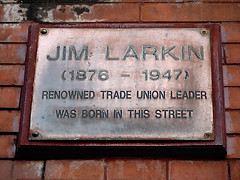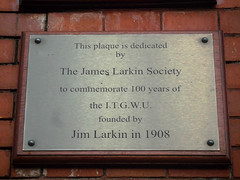James Larkin
Commemorated on 2 plaques
Jim Larkin (1876 - 1947) renowned Trade Union leader was born in this street
The Globe, Combermere Street, Liverpool, United Kingdom where they was born (1876)
This plaque is dedicated by The James Larkin Society to commemorate 100 years of the I.T.G.W.U. founded by Jim Larkin in 1908
The Globe, Combermere Street, Liverpool, United Kingdom where they was


